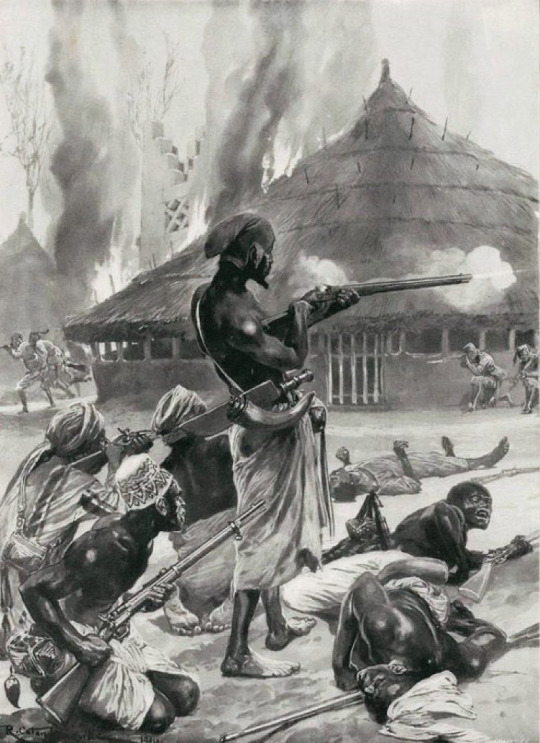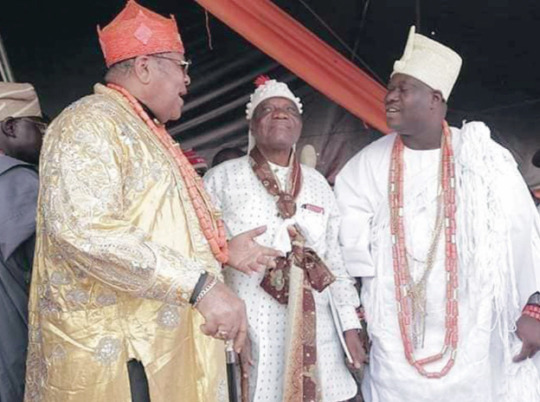#ibibioland
Text

Aro Confederacy
The Aro Confederacy (1690–1902) was a political union orchestrated by the Aro people, Igbo subgroup, centered in Arochukwu in present-day southeastern Nigeria. The Aro Confederacy kingdom was founded after the beginning of the Aro-Ibibio Wars. Their influence and presence was all over Eastern Nigeria, lower Middle Belt, and parts of present-day Cameroon and Equatorial Guinea during the 18th and 19th centuries. The Arochukwu Kingdom was an economic, political, and an oracular center as it was home of the Ibini Ukpabi oracle, High Priests, the Aro King Eze Aro, and central council (Okpankpo). The Aro Confederacy was a powerful and influential political and economic alliance of various Igbo-speaking communities in southeastern Nigeria. It emerged during the 17th century and played a significant role in the region until the late 19th century.
The exact origins of the Aro Confederacy are not precisely documented, but it is believed to have been established around the mid-17th century. The Aro people, who were part of the Igbo ethnic group, inhabited the region around present-day Arochukwu in Abia State, Nigeria. They were skilled traders and missionaries who played a pivotal role in connecting various Igbo communities. This migration and their military power, and wars with neighboring kingdoms like supported by their alliances with several related neighboring Igbo and eastern Cross River militarized states (particularly Ohafia, Edda, Abam, Abiriba, Afikpo, Ekoi, Bahumono, Amasiri etc.), quickly established the Aro Confederacy as a regional economic power. The Aro Confederacy's strength came from its well-organized network of Aro agents who were dispersed across different communities in the region. These agents acted as intermediaries in trade, diplomacy, and religious matters. They facilitated commerce, resolved disputes, and spread the worship of the Aro deity known as the "Long Juju" oracle."The Opening Up of Nigeria, the Expedition Against the Aros by Richard Caton Woodville II" 1901
The "Long Juju" oracle was the spiritual centerpiece of the Aro Confederacy. It was housed in Arochukwu and considered a potent source of political authority and religious guidance. The Aro people used the oracle to enforce their influence and control over surrounding communities. It also served as a means to administer justice and settle disputes, often attracting pilgrims seeking solutions to their problems.
The Aro Confederacy gained significant economic power through trade and commerce Their economy was primarily based on agriculture, with the cultivation of crops like palm oil, yams, and cassava. They were also involved in trade with neighboring communities and European merchants. They controlled trade routes that passed through their territories, collecting tolls and taxes from traders. The Aro also engaged in the Trans-Atlantic slave trade by capturing and selling slaves to European traders.
Aro activities on the coast helped the growth of city-states in the Niger Delta, and these city states became important centres for the export of palm oil and slaves. Such city-states included Opobo, Bonny, Nembe, Calabar, as well as other slave trading city-states controlled by the Ijaw, Efik, and Igbo. The Aros formed a strong trading network, colonies, and incorporated hundreds of communities that formed into powerful kingdoms. The Ajalli, Arondizuogu, Ndikelionwu, and Igbene Kingdoms were some of the most powerful Aro states in the Confederacy after Arochukwu. Some were founded and named after commanders and chiefs like Izuogu Mgbokpo and Iheme who led Aro/Abam forces to conquer Ikpa Ora and founded Arondizuogu. Later Aro commanders such as Okoro Idozuka (also of Arondizuogu) expanded the state's borders through warfare at the start of the 19th century. Aro migrations also played a large role in the expansion of Ozizza, Afikpo, Amasiri, Izombe, and many other city-states. For example, Aro soldiers founded at least three villages in Ozizza. The Aro Confederacy's power, however, derived mostly from its economic and religious position. With European colonists on their way at the end of the 19th century, things changed.Burning of Arochukwu 1901
During the 1890s, the Royal Niger Company of Britain bore friction with the Aros because of their economic dominance. The Aro resisted British penetration in the hinterland because their economic and religious influence was being threatened. The Aro and their allies launched offensives against British allies in Igboland and Ibibioland. After failed negotiations, the British attempted to conquer the Aro Confederacy in 1899. By 1901, the tensions were especially intensified when British prepared for the Aro Expedition. The invasion of Obegu (in Igboland) was the last major Aro offensive before the start of the Anglo-Aro War. In November 1901, the British launched the Aro Expedition and after strong Aro resistance, Arochukwu was captured on December 28, 1901. By early 1902, the war was over, and the Aro Confederacy collapsed. Contrary to the belief that the Ibini Ukpabi was destroyed, the shrine still exists, and is intact in Arochukwu and serves mainly as a tourist site.

#african#afrakan#kemetic dreams#africans#afrakans#brown skin#brownskin#african culture#afrakan spirituality#arochukwu#anglo aro war#obegu#igboland#ibibioland#igbo#igbo culture#british#long juju#aro confederacy#confederacy#nigerian#cameroon
26 notes
·
View notes
Photo

Ibibio Isong-O! “A king has emerged. The entire traditional stool of the Ibibio nation has been bestowed on the Oku Ibom Ibibio today.”
#akwa ibom#Features#ibibio#ibibioland#nteyin etuk#oku ibom coronation#oku ibom ibom ibibio#Ooni of Ife
0 notes
Text
Akwa Esop Imaisong Ibibio mourns Engr. Bassey
Akwa Esop Imaisong Ibibio mourns Engr. Bassey
Akwa Esop Imaisong Ibibio mourns Engr. Bassey
As Ntisong Ekidem, Senator Aloysius Etok, others pay tributes
By Emmanuel Ufon
The Leadership of the apex Socio-Cultural organization in Ibibioland, Akwa Esop Imaisong Ibibio, led by Ntisong Essien Ekidem payed a condolence visit to commiserate with the family of Engr. B. G. Bassey on Thursday, 4th February 2021.
Bassey, a titleholder of Mkpisong in…

View On WordPress
0 notes
Text
if you are wondering how I am doing, in my dream last night I could not locate Ibibioland (the homeland of Ibibio people) on a map and I was so frustrated
7 notes
·
View notes
Text
WOMEN AND SOCIO ECONOMIC DEVELOPMENT IN IBIBIOLAND 18851970.DOCX
WOMEN AND SOCIO ECONOMIC DEVELOPMENT IN IBIBIOLAND 18851970.DOCX
View On WordPress
0 notes
Text
Opinion: Dino Melaye: The Making Of A Brand
#bunraku [uncova.com]Japanese-styled Bungaku-Bunraku enactments, a dose of medieval commedia d’ell arte and an enormous supply of Yoruba Alarinjo with a bit of the Akata from Efik and Ibibioland. And the star in this comedy of errors that the Nigerian National ...
0 notes